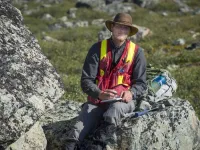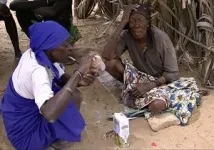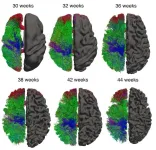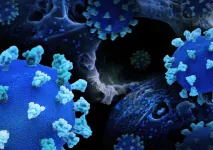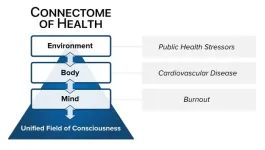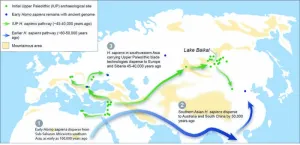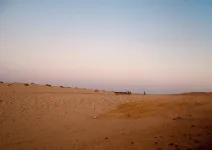(Press-News.org) UNIVERSITY PARK, Pa. — The Earth’s crust continued a slow process of reworking for billions of years, rather than rapidly slowing its growth some 3 billion years ago, according to a Penn State-led research team. The new finding contradicts existing theories that suggest the rapid formation of tectonic plates earlier in Earth’s history, researchers said.
They published the research in Geochemical Perspectives Letters.
The work may help answer a fundamental question about our planet and could hold clues as to the formation of other planets, according to lead author Jesse Reimink, assistant professor of geosciences.
“The dominating theory points to an inflection point some 3 billion years ago, implying we had a stagnant lid planet with no tectonic activity before a sudden shift to tectonic plates,” Reimink said. “We’ve shown that’s not the case.”
To chart the formulation of the Earth’s crust — or the crustal growth curve — researchers turned to more than 600,000 samples comprising the Earth’s rock records database. Researchers across the globe — including at Penn State — have analyzed each rock sample in the record to determine geochemical contents and age. Researchers chose the rock records over mineral samples, which informed the theory of a more sudden formation, because they said the rock record is more sensitive and less prone to bias on those time scales.
Knowing that the reliability of the mineral record decreases through time, researchers recreated the crustal growth curve using the rock records. To do that, they developed a unique method for determining how igneous rocks dating to millions of years ago were reworked and reformed over time: experimentally demonstrating how the same rock could change in different ways over time. Rocks can be reformed a number of ways, such as weathering into sediments or being remelted in the mantle, so researchers used this experimental data to inform novel mathematical tools capable of analyzing the rock records and working out the differences in sample changes.
“We calculated how much reworking has happened by looking at the composition of igneous rocks in a new way that teases out the proportion of sediments,” Reimink said.
They used these calculations to calibrate the reworking documented in the rock records. Then, researchers calculated Earth’s crustal growth curve using the new understanding of how the rocks were reformed. They compared the newly calculated curve to the rate of growth gleaned from mineral records by other experts.
Reimink and his team’s work indicates the Earth’s crust follows the path of the mantle — the layer on which the crust sits — suggesting a correlation between the two. It’s not the first time geoscientists have suggested a more gradual crustal growth, Reimink said; however, it’s the first time the rock record has been used to back it up.
“Our crustal growth curve matches the mantle record of growth, so it seems like those two signals are overlapping in a way that they did not when using the mineral record to create the crustal growth curve,” Reimink said.
Reimink cautioned that the research improves on what researchers understand, but it’s not the be-all and the end-all for crustal growth research. There are simply too few data points to speak to the vast time and space of the Earth’s crust. However, Reimink said, further analyzing the existing data points may help inform investigations of other planets. Venus, for example, has no tectonic plates and could be a modern day example of early Earth.
“When did Earth and Venus become different?” Reimink asked. “And why did they become different? This crustal growth rate plays into that a lot. It tells the how, what and why of how planets evolved on different trajectories.”
Joshua Davies, of the University of Quebec at Montreal; Jean-François Moyen, of the University of Lyon, France; and D. Graham Pearson, of the University of Alberta, Canada, contributed to this research.
The Natural Sciences and Engineering Research Council of Canada supported this research in part.
END
Earth’s crust, tectonic plates gradually formed, geoscientists find
2023-09-22
ELSE PRESS RELEASES FROM THIS DATE:
Dinosaur feathers contain traces of ancient proteins, study finds
2023-09-22
How similar are dinosaurs to modern birds? This question is at the heart of a new study that examined how proteins found in dinosaur feathers changed over millions of years and under extreme heat.
Previous studies suggest that dinosaur feathers contained proteins that made them less stiff than modern bird feathers. Now, researchers with University College Cork (UCC), the Stanford Synchrotron Radiation Light Source (SSRL) at the Department of Energy's SLAC National Accelerator Laboratory and other institutions have discovered that dinosaur feathers originally had a very similar protein composition to those of modern birds. That result ...
Q&A: How new software is changing our understanding of human brain development
2023-09-22
A single brain is unfathomably complex. So brain researchers, whether they’re looking at datasets built from 300,000 neurons in 81 mice or from MRIs of 1,200 young adults, are now dealing with so much information that they must also come up with new methods to comprehend it. Developing new analysis tools has become as important as using them to understand brain health and development.
A team including researchers at the University of Washington recently used new software to compare MRIs from 300 babies and discovered that myelin, a part of the brain’s so-called white matter, develops much slower after birth. The researchers published their findings Aug. ...
Clinical trial to test immune modulation strategy for hospitalized COVID-19 patients begins
2023-09-22
A clinical trial has launched to test whether early intensive immune modulation for hospitalized COVID-19 patients with relatively mild illness is beneficial. The placebo-controlled study, part of the global clinical trials consortium known as Strategies and Treatments for Respiratory Infections and Viral Emergencies (STRIVE), will enroll approximately 1,500 people at research sites around the world. It is supported by the National Institutes of Health’s National Institute of Allergy and Infectious Diseases (NIAID) in partnership with NIH’s National Center for Advancing Translational Sciences (NCATS).
Immune ...
Five factors that assess well-being of science predict support for increasing US science funding
2023-09-22
PHILADELPHIA – A study in the Proceedings of the National Academy of Sciences (PNAS) identifies five factors that Annenberg Public Policy Center (APPC) researchers say reflect public assessments of science and are associated with public support for increasing funding of science and support for federal funding of basic research. These factors are whether science and scientists are perceived to be credible and prudent, and whether their work is perceived to be untainted by bias, self-correcting, and beneficial.
Drawing on 13 questions in APPC’s 2022 nationally representative ...
Editorial addresses clinician burnout with unifying systems medicine model
2023-09-22
A new editorial published in the Heart and Mind journal proposes an innovative systems medicine approach to address the epidemic of clinician burnout and holistically improve clinician mental health and wellbeing (Heart and Mind: September 18, 2023. | DOI: 10.4103/hm.HM-D-23-00013, published ahead of print).
In the US and globally, clinician burnout has reached epidemic levels, with over 50% of physicians and healthcare providers reporting symptoms. Besides impairing quality of life, burnout increases risk of mental health disorders, cardiovascular disease and impaired ...
Pollen analysis suggests peopling of Siberia and Europe by modern humans occurred during a major Pleistocene warming spell
2023-09-22
LAWRENCE — It’s an Ice Age mystery that’s been debated for decades among anthropologists: Exactly when and how did the flow of Homo sapiens in Eurasia happen? Did a cold snap or a warming spell drive early human movement from Africa into Europe and Asia?
A new study appearing in Science Advances compares Pleistocene vegetation communities around Lake Baikal in Siberia, Russia, to the oldest archeological traces of Homo sapiens in the region. The researchers use the “remarkable evidence” to tell a compelling story from 45,000-50,000 years ago with new detail: how the first humans migrated across ...
Many low- or middle-income countries unprepared for the battle against cardiovascular disease
2023-09-22
Most healthcare facilities in many Low- and Middle-income Countries (LMICs) are unprepared to treat patients with cardiovascular diseases – despite these conditions leading to millions of people dying prematurely every year, a new study reveals.
Experts analysed health survey data from eight LMICs across four World Health Organisation world regions to discover that most facilities are unprepared to deliver services to treat or manage cardiovascular disease risk factors (CVDRF) such as diabetes and hypertension.
However, the increased ...
Probing the deep genetic structure of Africa
2023-09-22
Africa is the birthplace of modern humans and the continent with the highest level of genetic diversity. While ancient DNA studies are revealing some aspects of the genetic structure of Africa before the spread of food production, issues concerning DNA preservation have limited the insights from ancient DNA. Hoping to find clues in modern populations, researchers from a Portuguese-Angolan TwinLab ventured into the Angolan Namib desert – a remote, multi-ethnic region where different traditions met. “We were able to locate groups which were thought to have disappeared more than 50 years ago”, states Jorge ...
UC San Diego Health named national leader in delivering high-quality patient care
2023-09-22
UC San Diego Health has been recognized as a top performer in the 2023 Bernard A. Birnbaum, MD, Quality Leadership Ranking by Vizient, Inc. for its excellence in delivering high-quality patient care. This achievement represents the fifth consecutive year that UC San Diego Health has been ranked among the top ten academic health systems in the United States.
“This incredible accomplishment is a direct result of the exceptional care provided each day by our multidisciplinary teams throughout our health system,” said Patty Maysent, CEO of UC San Diego Health. “We are extremely proud to have achieved this national honor now for five years in a row, which ...
Louisiana Cancer Research Center Associate Director of Administration Sven Davisson named Treasurer of Association of Independent Research Institutes
2023-09-22
Louisiana Cancer Research Center (LCRC) Associate Director of Administration Sven Davisson has been appointed to the board of the Association of Independent Research Institutes (AIRI).
During his two-year term, Davisson will serve as the organization’s treasurer. He has served the organization in various roles since 2012.
AIRI is a national association of independent, not-for-profit biomedical and behavioral research institutes whose mission is to enhance the ability of its members to improve human health and advance knowledge through networking, education, and involvement in the development of science ...
